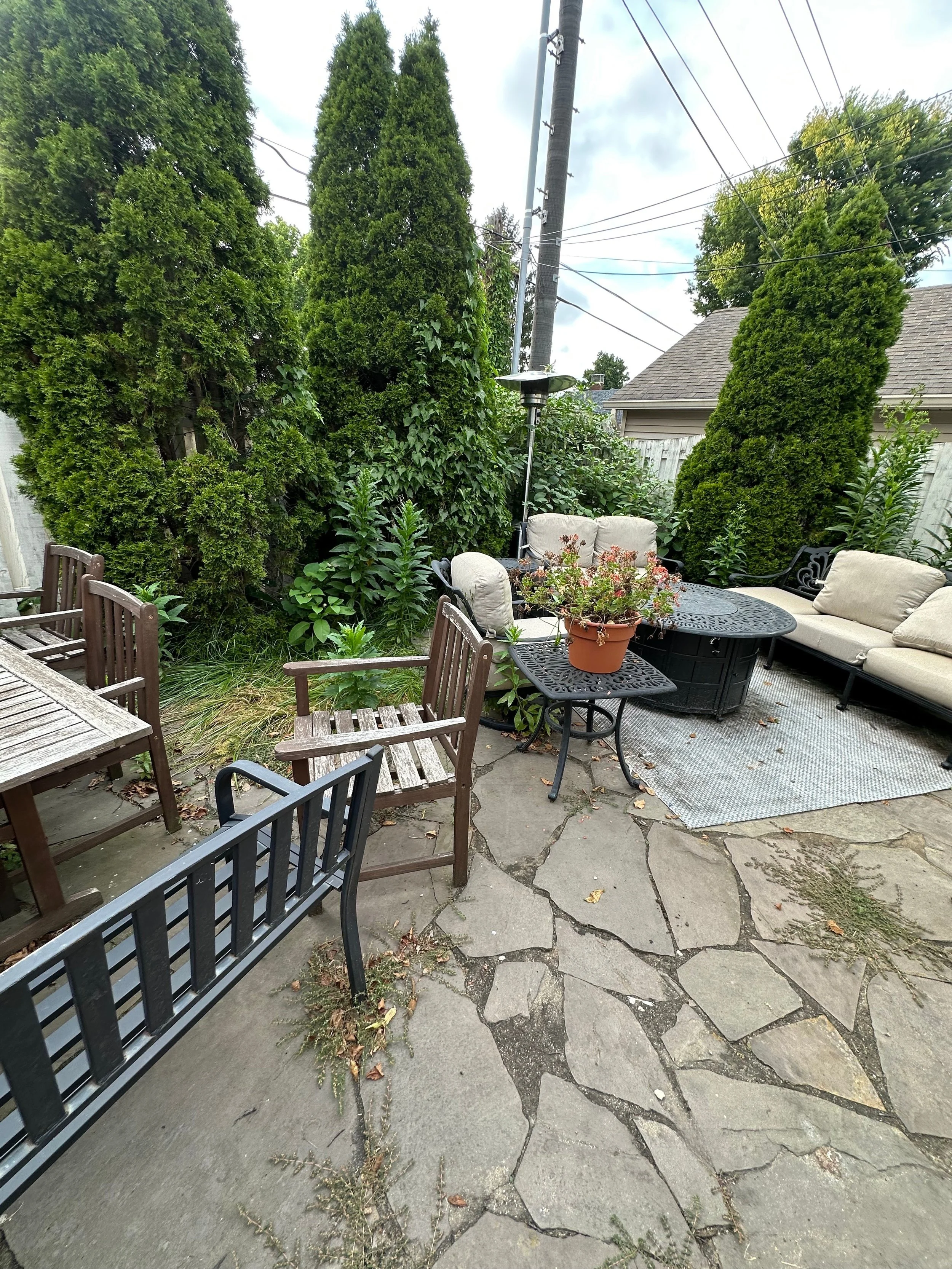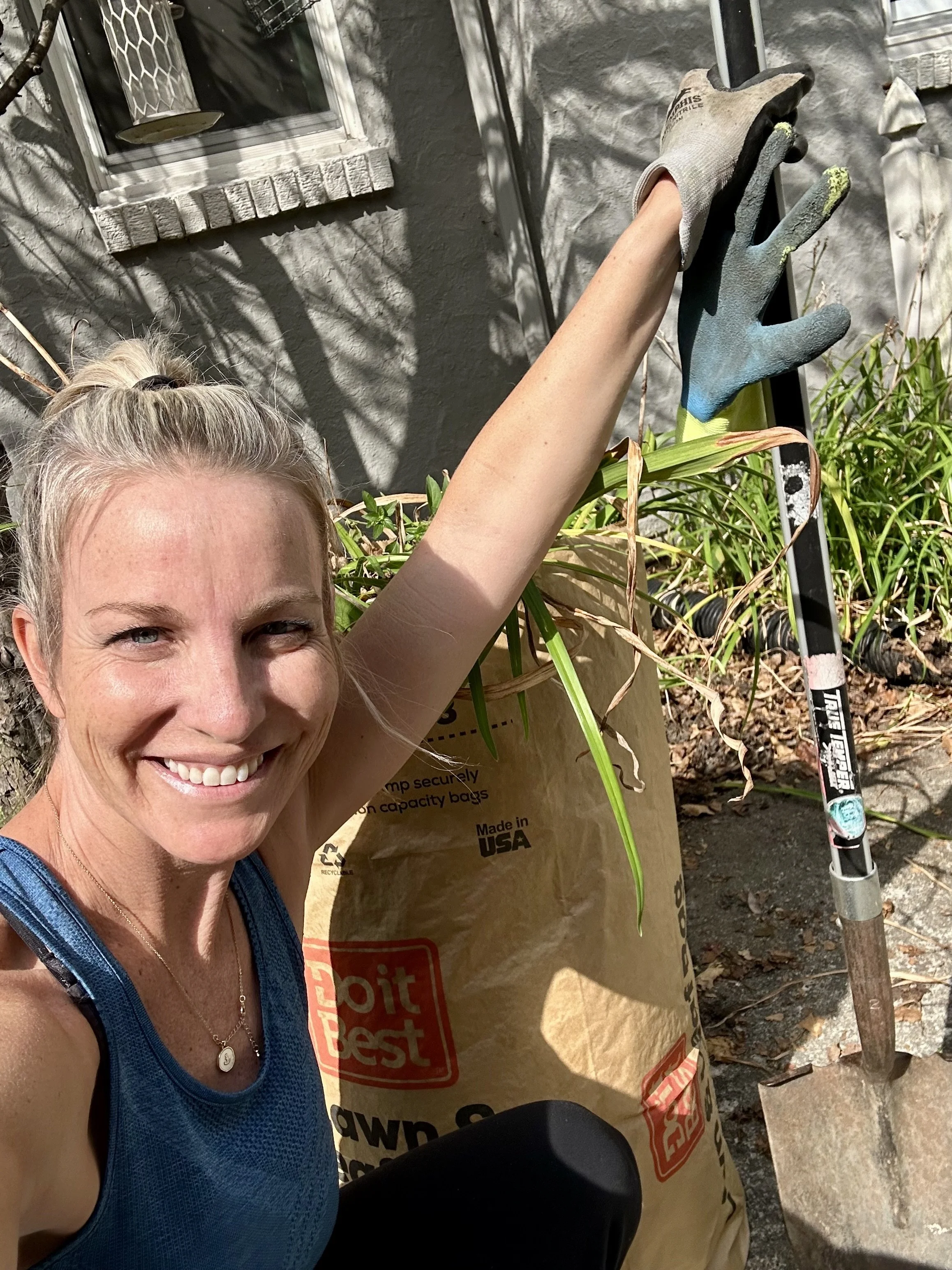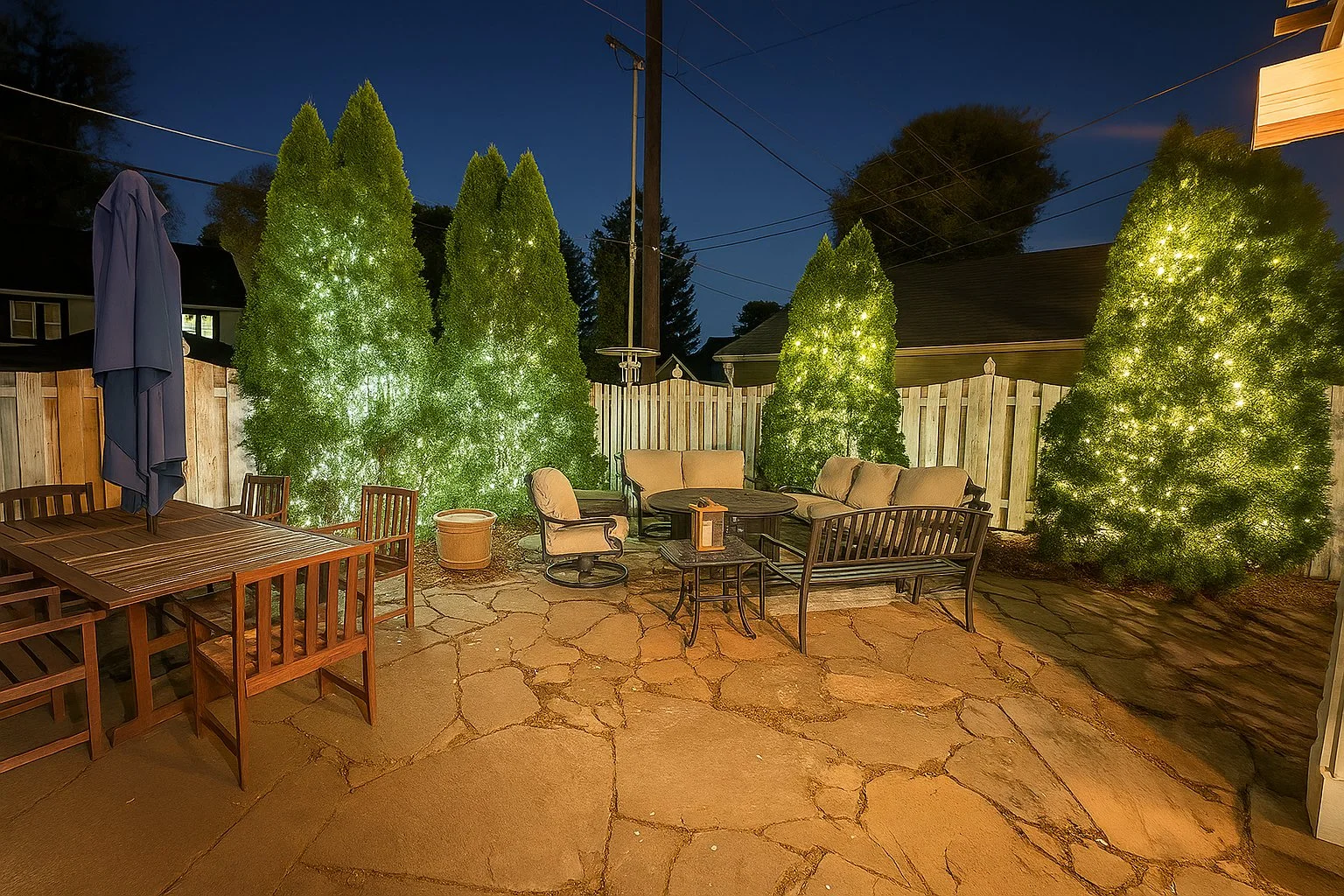Weeding and Recalibrating: Finding Your Center After Divorce - and again…
As I write this, my fingernails are still dirty from a weekend spent furiously pulling weeds and aggressively edging lawn lines that had gone completely awry. This summer was filled with so much yang energy: hot temperatures, endless sunshine, exciting travel, and joy-filled moments with and without my children. That vibrant, outward-focused energy nourished my soul in ways I desperately needed. But yang energy, for all its gifts, can also pull us away from center—quite literally pulling me away from my home, my routines, and the quiet “yin” maintenance that keeps life in balance. The return to school routines forced me back into rhythms I didn't realize I'd been missing.
There's something satisfying about the physical act of restoration, and something equally revealing about what it mirrors in our inner lives. As I worked on my hands and knees, pulling every neglected weed, the metaphor wasn't lost on me: What weeds had sprouted in my own life while I wasn't paying attention? Where had I allowed unwanted energy to spill over into carefully protected spaces?
The Gift of Structure
Being a parent to children in a traditional school environment offers an unexpected gift: it forces us back into rhythms and structures we may not have realized we needed. As summer's wild freedom gave way to September's steady pulse, I found myself naturally drawn to recalibrate.
In an attempt to ground down and anchor after months of beautiful chaos, I spent the past few weekends in what I can only describe as cathartic restoration. I found myself pulling every weed that had been neglected in my yard while we were away, aggressively edging the lawn lines that had gone completely awry—like those unwanted body hairs we women in midlife often discover sprouting in the most inconvenient places.
Pulling weeds and reinforcing boundary lines.
This metaphor was not lost on me.
The Divorce Endorphin Rush
When I first moved into my new home five years ago, I was running on what I now recognize as divorce endorphins. There's this incredible rush that accompanies the fresh start—a biochemical high that catapults you into action. I cleaned, polished, and saged everything in this house. I had a manifestation list and was determined to realize every single item. I wanted my new home, inside and out, to emulate the feelings of sanctuary I craved.
My daughter and I created a backyard oasis, stringing each tree with twinkle lights. Those lights represented hope, magic, the life we were building together. Everything sparkled with possibility.
The energy was intoxicating. Friends and family rallied around us, helping us paint rooms and plant flowers. There's something beautiful about how the world responds to fresh beginnings—people want to be part of the butterfly elosing from its chrysalis and revealing its beautiful wings.
When the Glow Fades
Now, five years later, paint has chipped away, patios need power washing, and strings of lights have burned out and need replacing. That's exactly where I found myself this weekend—in another place of maintenance, in need of a refresh.
My messy, overgrown, unsparkly patio landscape. (Which also represents a summer filled with working and memory-making away from home - having fun in the sun with my kids)
But here's what I've discovered: it's somehow more difficult to recognize that life continues to require "glow-ups" long after the initial transformation. When you're newly divorced, it's easier to ask for and receive help because you're positioned as someone recovering from life's circumstances. People rally around fresh starts. There's a clear narrative: woman rebuilds life, community supports healing journey.
Five years out, the questions become trickier: Can I still ask for help? Shouldn't I be more self-sufficient by now? Shouldn't I have figured this out already? That limiting belief—that we should be "done" needing support—will only get you short-term gains.
The Inner Landscape
Creating space for sparkle isn’t always sexy…
As I worked with my hands in the earth this weekend, the deeper questions began to surface:
What weeds have sprouted in my inner landscape that I've neglected? What old habits have snuck back in while I wasn't paying attention, demanding to be pulled at the root?
Where have I allowed boundary lines to blur, letting unwanted energy spill over into spaces I've worked so hard to protect and cultivate?
The pulling and edging became metaphorical to my reality. The physical act of restoration that mirrors our emotional and spiritual work is healing in the way it aligns the insides and outsides of things. Here I was again, living the eternal cycle of order—disorder—reorder that defines not just divorce recovery, but life itself.
But this time felt different. This wasn't the manic energy of new beginnings. This was the quieter, steadier work of maintenance. Less sexy, perhaps, but equally necessary.
The Truth About Maintenance
Maintaining that glow takes constant check-ins. It's never a “one-off” task to complete —just like laundry or lawn care. This is what I continue to discover, practice, and share with my clients.
Glow-ups should never be utilized as a one-time makeover. They're an everyday practice, a commitment to tending the life you've built even when the initial endorphin rush has faded and the world has moved on from celebrating your transformation.
The burned-out twinkle lights in my backyard trees are a perfect metaphor. Those lights still matter—they still represent the magic my daughter and I created together. They just need tending. Just like we do.
Creating Space for Magic & the Permission to Keep Growing
Less weeds. More sparkle. Mostly, space for people I love (including my own quiet company).
Now that I've cleared the weeds and reestablished clean lines, there's room. Space for more abundance. Space for creativity to flourish. Space for the kind of magic that only emerges when we've done the hard work of tending our inner and outer gardens.
This is the work that continues long after the divorce papers are signed, long after we think we've "moved on." It's the ongoing practice of checking in with ourselves, of noticing when we've drifted from our center, and having the courage to do the sometimes uncomfortable work of realigning.
Here's what I wish someone had told me five years ago: You don't graduate from needing support. You don't reach a finish line where maintenance stops being necessary. The house you build—both literally and metaphorically—will always need tending.
And that's not a failure. That's being human.
The courage to ask for help, to admit when something needs attention, to recognize when it's time for another round of weeding and edging—that's not weakness. That's wisdom.
Your Turn to Reflect
In what ways have you found yourself weeding, pruning, edging, and restructuring in this chapter of your life?
Perhaps it's:
Setting boundaries with an ex-spouse who still tries to control your schedule
Clearing out friendships that no longer serve your growth
Establishing new routines that honor who you're becoming
Creating physical spaces in your home that reflect your authentic self
Saying no to commitments that drain rather than energize you
Recognizing that the support system you needed in year one might look different in year five
Giving yourself permission to refresh, restart, and glow-up again
Divorce doesn't end when the papers are signed, and neither does the need for support, maintenance, and renewal. The journey of becoming who we're meant to be—of creating the life we truly want—requires regular maintenance, seasonal recalibration, and the wisdom to recognize when it's time to pick up our tools and tend to our garden once again.
Sometimes that looks like furiously pulling weeds on a September weekend. Sometimes it's replacing burned-out twinkle lights that once symbolized hope. Sometimes it's giving yourself permission to ask for help, even years later, because growth is not a destination—it's a practice.
The key is staying awake to the process, honoring both the yang energy that propels us forward and the yin energy that calls us home to ourselves.
Needing maintenance doesn't mean you're broken. It means you're alive, you're growing, and you're committed to the ongoing practice of becoming who you're meant to be.
Love,






